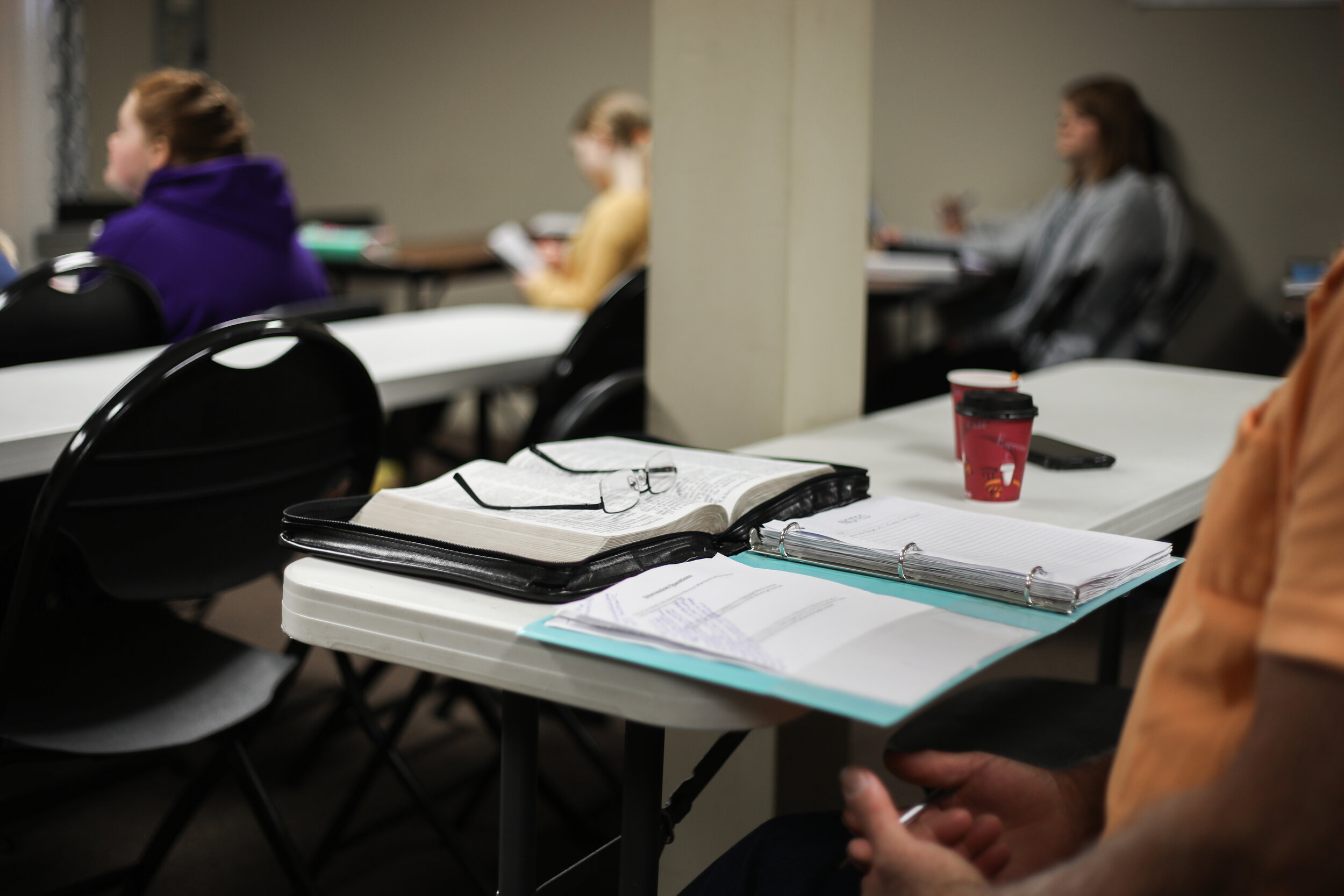
Policies
METHODS OF INSTRUCTION
Pastor/Professor lectures are watched in person on campus or by streaming within the myLFBI online classroom environment. Classes may be watched throughout the week if you cannot attend class live. Instructors will administer and require reading assignments, self-directed study/research, project-oriented assignments, essays or finals. Each week’s lecture will conclude with a weekly post-lecture online quiz.
LFBI quizzes will remain posted for 10-days before they are removed. Incomplete quizzes will be an automatic “0”. Ensure your success by staying on pace with lectures and completing assignments in a timely manner. Do not contact professors or institute administrators about “missed quizzes” unless you have a doctor’s note or in the case of clear administrative error.
ATTENDANCE POLICY
Living Faith Bible Institute requires 100% attendance. All attendance issues will be handled directly by the course instructor within your specific class. From there, it may be deferred to the Registrar’s Office. If a student misses a class but believes it may be excused, they will contact the Registrar. We believe that students have many potential extenuating circumstances that contribute to absence and for this reason, course records distinguish between excused and unexcused absence. The Registrar’s Office staff are available to help students regarding any concern with attendance.
Whether you are attending classes online or in person, it is important for students to put together a personal attendance plan. Being present and prepared for class is critical to getting the instructional experience necessary for growth. The following are the attendance requirements and policies for LFBI:
Students are responsible to make up all missed information, instruction and assignments accrued while absent from class.
For online students, if you miss the live viewing of any class lecture, you will have ten days to view the class online before the corresponding quiz becomes inaccessible and you are considered absent.
All students who miss class (i.e., sickness, missions’ trips, work schedules) will be expected to stay caught up with each week's class. Instructors may, at their discretion, grant extensions to students who miss class under special circumstances.
Students who wish to contest an unexcused absence may fill out an Absence Form for review by the Registrar’s Office.
When in live attendance, the student is expected to show common courtesy to the professor and fellow students by being punctual. Students who are regularly late to class or are a distraction to other students and are susceptible to being reported to the Registrar’s Office.
GRADING POLICY
LFBI Grading Scale
A: 92-100% Excellent. Mastery of course material.
B: 83-91% Good. Reasonable understanding of course material.
C: 74-82% Satisfactory. Basic comprehension of course material.
D: 65-73% Poor. Minimal knowledge of course material.
LFBI Grade-Point Calculation
LFBI receives transfer grades based on grade-point averages from the above scale. LFBI does not transfer letter grades. This is critical to the consideration of student honors at graduation. LFBI Instructors will calculate a percentage grade on each assignment entered in myLFBI.
Late Assignments
The Living Faith Bible Institute has a school-wide standard for the submission and grading of late assignments.
This policy does not apply to any weekly assignments, tests or post-lecture quizzes, only major assignments (essays, projects, research, etc.)
Each day that a major assignment is late, 10% will be deducted from the overall grade.
Any major assignment that is late can be submitted at any point in the semester, up to the last day of class lectures, but will not earn any more than 50% of the total grade on that assignment.
Academic Standing & Probation
Students' academic status is assessed at the end of every term, whether the student is full-time or part-time. A summer session is considered the same as a semester for the purpose of the following regulations:
Academic Warning: Students will be placed on Academic Warning via email when 1) their grade point average is under 2.0 after the first semester of enrollment or 2) their grade point average is .7 (D-) or below for two consecutive semesters. They will be taken off Academic Warning when they achieve two semesters with a GPA of 2.0 or higher.
Students on academic warning will be required to write a formal plan for improving their grades before the end of the semester.
Academic Probation: Students will be notified that they are being placed on Academic Probation and will be required to coordinate/communicate regularly (once a week) with their LFBI Academic Mentor via phone call, in-person meeting, or video call in alignment with the LFBI Academic Mentor Checklist. Students will be required to meet with their Academic Advisor in order to enroll in their courses for the semesters they are on probation.
In general, students will be placed on academic probation whenever their official grade-point average falls below 2.0 (C average).
Students will also be placed on academic probation if they earn at least one failing grade for three consecutive semesters.
Students on academic probation will be restored to good standing whenever the grade-point average reaches at least 2.0.
Students have three successive semesters (including the semester in which they originally were placed on probation) to remove themselves from academic probation. Otherwise, they are ineligible to re-enroll without the approval of the academic office.
Students are responsible for knowing their academic status by referring to myLFBI and their permanent transcript.
For first time students who have a grade point average below 2.0 at the end of their first semester of either full- or part-time study will be placed on academic warning. Students on academic warning must achieve an overall 2.0 average by the end of their second semester or be placed on regular probation. At this point, they will be subject to the regular probation requirements.
Academic Suspension: Students are not allowed to enroll in courses for a length of time determined by the Academic Office and will attend a meeting with the Provost of LFBI before enrolling for classes.
Academic Dismissal: Students who have not met the requirements for improving and maintaining progress in their studies will be subject to removal from the school.
Enrollment & DROP POLICY
In Spring and Fall courses, students have until the end of the second complete week of semester classes to enroll for two credit hour courses. Students will have until the end of the first complete week of semester classes to enroll for one credit hour courses. If you enroll late, the penalty is that assignments or quizzes associated with any missed sessions will not be accepted for a grade.
In a Summer course, students have until the end of the fourth week to enroll for a class. All summer work is due by the last day of class.
There will be no refunds for early withdrawal beyond the second complete week of class for two-credit hour courses or for incomplete classes.
There will be no refunds for early withdrawal beyond the first complete week of class for one-credit hour courses or for incomplete classes.
Students who enroll in Fall or Spring two-credit hour courses may be re-assigned as an “audit student” upon request prior to the end of week four but will not receive a refund for the price difference. Beyond the end of the week four deadline, all students will receive their final earned grade at the end of the semester, regardless of what was or was not completed.
Students who enroll in Fall or Spring one-credit hour courses may be re-assigned as an “audit student” upon request prior to the end of week two but will not receive a refund for the price difference. Beyond the end of the week two deadline, all students will receive their final earned grade at the end of the semester, regardless of what was or was not completed.
Students who enroll in Summer Self-Pace courses may drop the course upon request prior to the end of week two but will not receive a refund. Beyond the end of week two, all students will receive their final earned grade regardless of what was completed.
Students will receive a failing grade for an incomplete course. Failing grades do go on the student transcript. Students may retake a class for credit the next time it is offered by re-enrolling and paying tuition. Both grades will be recorded on the transcript.
Contact the Enrollment Office to change enrollment status prior to the designated timeframes outlined in the Enrollment & Drop policy.
Pastoral Approval policy
LFBI emphasizes students growing and learning ministry in the context of their local church. For this reason, all LFBI student applications require pastoral approval from a pastor within the students local church of membership. Furthermore, at any point within the degree program, a pastor may contact the academic office to withdraw their approval. If a student's pastoral approval is withdrawn, their degree process will be paused and the student will not be allowed to enroll in courses until their local church pastor approves. Any questions about this policy may be directed to the academic office.
TRANSCRIPT POLICY
All transferring students who want credit for classes taught through other institutions must submit a formal transcript along with associated course syllabus. This includes courses which are considered equivalents to our Foundations Program classes.
LFBI will consider transfer credit from like-minded institutions but we have established reciprocity agreements with particular theology schools and programs.
We will not accept any transcripts listing a pass/fail grade only. Transcripts must show a letter grade (or grade point average) for each course.
The minimum grade that will be accepted is a “C".
Students must complete at least 2/3 of their study or a maximum of 20 transfer credit hours are allowed for graduation consideration.
Students must complete at least 3/4 of their study or a maximum of 15 transfer credit hours are allowed for honors consideration at graduation.'
Sixty (60) credit hours are required for graduation.
Transcripts may be submitted to the Registrars Office for review.
The Ministry Practicum (2 credits) and the Missions Discovery Trip Course (pass/fail) are required for graduation.
Academic Conduct
Academic Misconduct
Academic misconduct is strictly prohibited and will result in a “0” for the course as well as a board review of student enrollment status. Academic misconduct includes zero tolerance for plagiarism, copying other student work, the use of AI to generate content, or the unsanctioned appropriation of instructor assessments and instructional tools. For more information on citation and how to avoid plagiarism, please enroll in or review the Freshman Orientation course.
Disability Statement
Students with a documented disability may contact the LFBI offices to make arrangements for academic accommodations.
Classroom Policies
Classroom policies will be established and enforced by the individual instructor. Cell phones, internet social networking and other distractions take away from the learning environment, so please refrain from their use in class.
Assessment Responsibility
Students are responsible for retaining copies of all completed assignments. In the case that an assignment is lost or mismanaged within the myLFBI platform, students will be accountable to resubmit all missing work.
Auditing
All auditing students must apply and enroll the same as “for credit” students.
Auditing students do not need to provide transcripts in order to meet requirements for upper level classes.
We do encourage all auditing students to follow the prescribed Program of Study, though it is not required.
Resource & Technology Policy
Every course in the Living Faith Bible Institute has required reading. Students are obligated to purchase their own reading materials in advance of the class and complete the reading in a timely manner in order to meet course requirements. LFBI does not supply required reading materials but does provide online library access and study resources through the myLFBI educational platform.
In order to deliver content, LFBI requires that every student has consistent and personal access to a laptop, tablet or device that not only provides you with internet access but allows you to complete and submit all assignments as they are required by the instructors.
Because the majority of class instruction and communication happens digitally, LFBI requires students to abide by standard digital ethics and etiquette:
Respect the rights of content creators and abide by copyright laws. Do not utilize or distribute copyrighted material without lawful permission or attribution, this is considered plagiarism. Students who plagiarize are subject to the academic misconduct policy and further decision of the board of formal review. All written assignments are subject to review through digital analysis.
Generative AI software is not permitted in the creation or *generation of ideas in any assignment. Utilizing AI software to generate ideas or content in order to pass them off as one’s own will be considered analogous to plagiarism and will be adjudicated as such by the board of formal review. All written assignments are subject to review through digital analysis.
Students may use AI to substantiate ideas, not generate ideas. By substantiate we mean that student use of AI is limited to writing critique (feedback on content, grammar or punctuation) OR to provide intellectual support (research and referral). It is our belief that creativity, interpretation, reasoning, argumentation and analysis concerning spiritual matters (1 Cor 2:13) is an endeavor for spiritual beings. Our program of study is intended to teach souls, train souls and assess whether or not those souls have retained knowledge, gained understanding and demonstrated wisdom in their learning. Over reliance on mechanisms that circumvent or replace this process hinders the effectiveness of LFBI. See a doctrinal on the subject of AI here.
Treat fellow online students and instructors with the same respect and kindness as you would in face-to-face interactions. Email or messaging correspondence should exhibit a character becoming of a Christian. Students who are reported as being disrespectful or unkind online will have their case submitted to the board of formal review.



